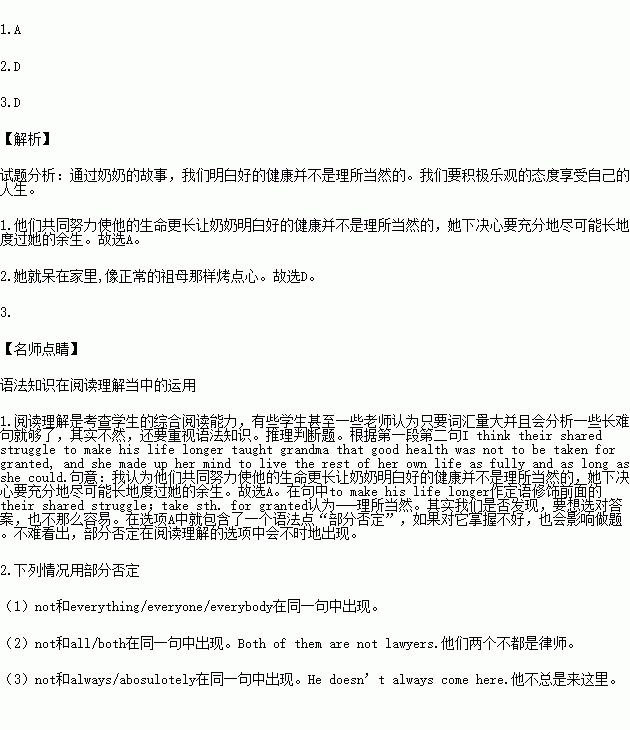题目内容
Grandma celebrated her fifty-third birthday just weeks before grandpa died of cancer in 1965. Although his passing was very difficult for her, I think their shared struggle to make his life longer taught grandma that good health was not to be taken for granted, and she made up her mind to live the rest of her own life as fully and as long as she could. One day, when she announced to attend lessons at the Fred Astaire Dance Studio in Portland, Oregon, where she lived, we rolled our eyes in embarrassment and helplessly wished she would just stay home and bake cookies as normal grandmothers did. Many years filled with countless dance lessons passed before we learned to appreciate the wonder of having a dancing grandma.
I suppose grandma's primary motivation for wanting to learn to dance was social. She had been a shy girl, always very tall and heavy, and had married into grandpa's quiet lifestyle before developing any elegance or confidence in her personal appearance. Dancing, on the other hand, filled her life with flash lights, wonderful parties, beautiful dresses, handsome young dance instructors, and the challenge of learning. Although the weekly dance lessons did not change her ample, two-hundred-pound figure, grandma surprised everyone with energetic performances on the dance floor, which soon gave her as much elegance and confidence as any Miss American competitor.
Having taken weekly dance lessons for years, my grandma learned various dances easily and was soon participating in dancing matches all over the Northwest. When I was fourteen, grandma proudly invited me to watch her compete in one of these matches to be held in the grand ballroom of the Red Lion Inn. My attitude was still unenthusiastic at that point, but to make her happy, my mother and I attended the match. As if to prove me wrong, grandma made a wonderful showing in every event she entered. I thought she was truly the queen of the ball during the dance, and my thoughts were shared by the judges a short time later when she was awarded a gold cup for her outstanding performance.
1.What did grandma learn from grandpa's death?
A. Good health was not there for everyone.
B. She should take dance lessons.
C. She had to struggle to live a better life.
D. She should wear beautiful dresses.
2.Normal grandmas usually ________ in the author's point of view?
A. took dance lessons
B. did some exercises at home
C. took care of grandchildren at home
D. did some housework at home
3.The author felt ______ when he was invited to watch grandma's match.
A. happy B. proud
C. excited D. uninterested
 应用题天天练四川大学出版社系列答案
应用题天天练四川大学出版社系列答案
